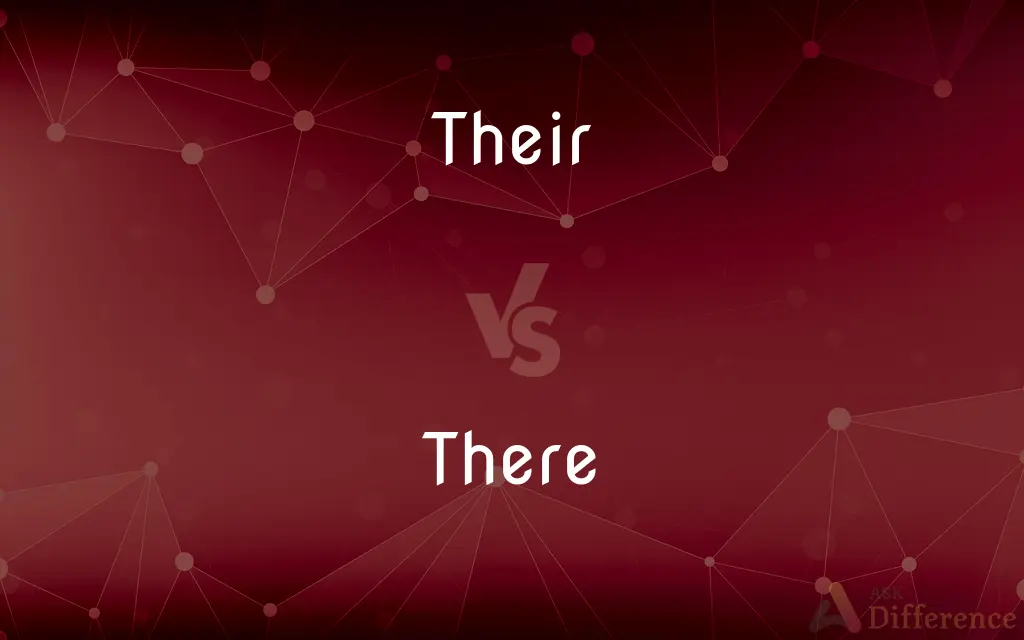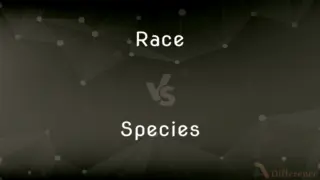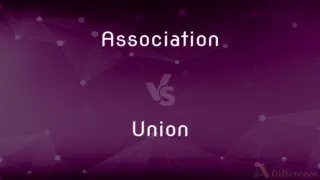Their vs. There — What's the Difference?
By Tayyaba Rehman — Updated on August 19, 2023
"Their" is a possessive pronoun indicating ownership, while "there" refers to a place or introduces a statement.

Difference Between Their and There
Table of Contents
ADVERTISEMENT
Key Differences
"Their" and "there" are common English words that are often misused. Their is a possessive pronoun, used to indicate ownership or association to a group. On the other hand, there can serve multiple roles, including a pronoun introducing a sentence, an adverb, or a noun referring to a place.
When considering the word their, think of possession. It’s a word that ties an object or idea to a group or individual. Their shows that something belongs to them. Meanwhile, there is versatile. It often refers to a place, either specific or vague.
To deepen the understanding of their, consider sentences like "Their opinions matter" or "It's their right to vote." In each case, their specifies to whom the opinions or right belong. Conversely, there provides context. When one remarks, "There's a chance of rain today," or "There are twenty students in the class," there is not about ownership but rather sets up or introduces the context.
The distinction between their and there is fundamental in English grammar. Their always relates to ownership or association. There, in contrast, primarily denotes place or introduces a subject. Grasping this difference ensures more accurate and effective communication.
Comparison Chart
Part of Speech
Possessive pronoun
Adverb, Pronoun, Noun
ADVERTISEMENT
Function
Indicates ownership
Refers to a place or introduces a subject
Example
"Their dog is friendly."
"The dog is over there."
Usage
Used with nouns to show possession
Used to specify a location or introduce statements
Common Confusion
Often mixed up with "there"
Often mixed up with "their"
Compare with Definitions
Their
Used to describe something owned by a group.
Their cake looks delicious.
There
In, at, or to that place or position.
We went to Paris and stayed there a week.
Their
Used as a modifier before a noun
The politicians boasted of their accomplishments. “It is fatal for anyone who writes to think of their sex” (Virginia Woolf). See Usage Notes at he1, they.
There
Indicates the existence of something.
There's a problem with your order.
Their
Refers to something that belongs to an unspecified person.
Someone forgot their umbrella.
There
At a point in an action, process, or story.
He's been working there for two years.
Their
A possessive pronoun relating to a group.
Their team won the match.
There
In that respect or particular.
I can't help you there.
Their
Indicates a connection to a certain group.
That's their signature move.
There
Used to introduce a sentence or clause.
There is a reason for everything.
Their
Relating to or associated with people in general.
It's only natural to want to share their own experiences.
There
At or in that place
Sit over there.
Their
Belonging to, from, of, or relating to, them (plural).
They will meet tomorrow at their convenience
This is probably their cat
There
Used to express feelings such as relief, satisfaction, sympathy, or anger
There, now I can have some peace!.
Their
Belonging to someone (one person, singular).
There
Used as an expletive subject of be in its sense of “exist”, with the semantic, usually indefinite subject being postponed or (occasionally) implied.
There are two apples on the table. [=Two apples are on the table.]
There is no way to do it. [=No way to do it exists.]
Is there an answer? [=Does an answer exist?]
No, there isn't. [=No, one doesn't exist.]
Their
The possessive case of the personal pronoun they; as, their houses; their country.
Nothing but the name of zeal appears'Twixt our best actions and the worst of theirs.
There
To, into, or toward that place
Wouldn't go there again.
Their
Misspelling of there
There
At that stage, moment, or point
Stop there before you make any more mistakes.
There
(location) In a place or location (stated, implied or otherwise indicated) at some distance from the speaker (compare here).
There
Used with other intransitive verbs of existence, in the same sense, or with other intransitive verbs, adding a sense of existence.
If x is a positive number, then there exists [=there is] a positive number y less than x.
There remain several problems with this approach. [=Several problems remain with this approach.]
Once upon a time, in a now-forgotten kingdom, there lived a woodsman with his wife. [=There was a woodsman, who lived with his wife.]
There arose a great wind out of the east. [=There was now a great wind, arising in the east.]
There
Used with other verbs, when raised.
There seems to be some difficulty with the papers. [=It seems that there is some difficulty with the papers.]
I expected there to be a simpler solution. [=I expected that there would be a simpler solution.]
There are beginning to be complications. [=It's beginning to be the case that there are complications.]
There
To or into that place; thither.
The rarest that e'er came there.
A knight there was, and that a worthy man.
There is a path which no fowl knoweth.
Wherever there is a sense or perception, there some idea is actually produced.
There have been that have delivered themselves from their ills by their good fortune or virtue.
Spend their good there it is reasonable.
There
A location other than here; that place;
You can take it from there
There
In or at that place;
They have lived there for years
It's not there
That man [who is] there
There
In that matter;
I agree with you there
There
To or toward that place; away from the speaker;
Go there around noon!
There
In that matter
I can't agree with him there.
There
In a readily accessible or discoverable state
The answer is out there. All we have to do is look for it.
There
Used especially for emphasis after the demonstrative pronoun that or those, or after a noun modified by the demonstrative adjective that or those
That person there ought to know the directions to town.
There
(Nonstandard) Used for emphasis between a demonstrative adjective meaning "that" or "those" and a noun
"You see them there handles?" (Cormac McCarthy)."I tell you ... that you buried paving-stones and earth in that there coffin" (Charles Dickens).
There
That place or point
Stopped and went on from there.
There
(figuratively) In that matter, relation, etc.; at that point, stage, etc., regarded as a distinct place.
He did not stop there, but continued his speech.
They patched up their differences, but matters did not end there.
There
(location) To or into that place; thither.
There
(obsolete) Where, there where, in which place.
There
In this world, used to say that someone or something exists; see pronoun section below.
There
Used to offer encouragement or sympathy.
There, there. Everything is going to turn out all right.
There
Used to express victory or completion.
There! That knot should hold.
There
That place.
There
That status; that position.
You rinse and de-string the green beans; I'll take it from there.
There
That.
Therefor, thereat, thereunder
There
(colloquial) Appended to words of greeting etc.
Hi there, young fellow.
Oh, hello there, Bob, how are you doing?
There
Misspelling of their
There
In or at that place.
The Lord God planted a garden eastward in Eden; and there he put the man whom he had formed.
There
In that matter, relation, etc.; at that point, stage, etc., regarded as a distinct place; as, he did not stop there, but continued his speech.
The law that theaten'd death becomes thy friendAnd turns it to exile; there art thou happy.
Common Curiosities
Can "there" start a sentence?
Yes, "there" often introduces sentences, such as "There is a cat" or "There are many options."
What is "their" mainly used for?
"Their" is primarily a possessive pronoun indicating ownership or association to a group.
How do you avoid confusing "their" and "there"?
Remember that "their" indicates ownership, while "there" often refers to a location or introduces a statement.
Does "there" always refer to a physical place?
No, "there" can also introduce sentences or indicate the existence of something, not just denote a location.
Is it correct to say "There's people"?
While commonly used in casual speech, it's grammatically correct to say "There are people."
Is "their" singular or plural?
"Their" is plural, but it's also accepted in singular form when referring to an unspecified gender, as in "Someone left their hat."
How is "there" used in a sentence?
"There" can refer to a place, introduce a statement, or indicate existence, as in "The book is there" or "There are three apples."
What's a quick tip to remember the difference between "their" and "there"?
Think of "here" in "there" for locations, and "heir" in "their" for possession.
Can both "their" and "there" appear in one sentence?
Yes, for example: "Their bags are over there."
Can "their" refer to businesses or entities?
Yes, "their" can refer to entities, like "The company unveiled their new product."
Share Your Discovery

Previous Comparison
Race vs. Species
Next Comparison
Association vs. UnionAuthor Spotlight
Written by
Tayyaba RehmanTayyaba Rehman is a distinguished writer, currently serving as a primary contributor to askdifference.com. As a researcher in semantics and etymology, Tayyaba's passion for the complexity of languages and their distinctions has found a perfect home on the platform. Tayyaba delves into the intricacies of language, distinguishing between commonly confused words and phrases, thereby providing clarity for readers worldwide.













































